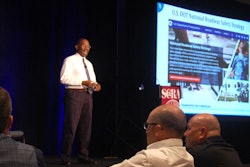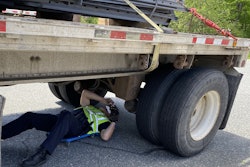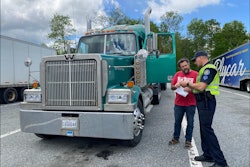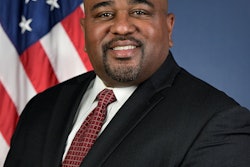Trucking news and briefs for Thursday, March 2, 2023:
Army veteran trucker seeks permanent HOS exemption
Truck driver and U.S. Army veteran John Olier is petitioning the Federal Motor Carrier Safety Administration for an exemption from several provisions of the hours of service regulations.
Specifically, Olier seeks a permanent exemption from the 10-hour break, the 14-hour driving window, the 11-hour driving limit, the 30-minute break requirement and the 70-hours-in-eight-days limit.
In the materials he submitted to FMCSA, Olier said he has 30 years as a licensed driver, including 11 years as an “expert driver” in the Army and five years as a CDL holder, adding that he has “never had an accident or incident involving safety.”
Olier said that as a former U.S. Army Airborne Ranger and scout/sniper, he has “extensive training in working continuous ops of 72 hours or more with little to no sleep periods.” He added that he has been trained “to recognize my body’s warning signs for fatigue and respond accordingly.”
Olier added that he has a “very different natural [sleep] cycle” for which the rigidity of the HOS regs doesn’t work.
As a refrigerated van operator, Olier said he often sleeps while waiting to be loaded and unloaded, which can be several hours and is enough for him to “function safely.” He added that over the last three years, he has “operated under various exemptions for more than 75%” of his time on the road, hauling under emergency declarations for FEMA operations, the COVID-19 emergency declaration, and while hauling ag-exempt commodities.

“Under these conditions, I have found that my time driving has been far less stressful and anxiety-inducing,” he said. “I’m not rushed. I am able to run when I’m alert and sleep when I’m not.”
FMCSA will accept comments on Olier’s request for 30 days beginning Friday, March 3. Comments can be made at www.regulations.gov by searching Docket No. FMCSA-2023-0051.
[Related: Owner-ops, groups: COVID hours waiver should open door for more flexibility]
Two states take aim at nuclear verdicts
Lawmakers in Florida and Iowa have turned their attention toward nuclear verdicts in efforts to decrease the likelihood of exorbitant damages being awarded in lawsuits where the party being sued is mostly not at fault.
On Feb. 14, Florida Gov. Ron DeSantis announced proposed tort reform in the state that would, among other things, “institute reforms to protect small businesses from being subjected to paying exorbitant damages when they are not primarily at fault,” a press release from DeSantis said. “Under current law, fraudsters and con artists prey on small businesses by filing lawsuits when injured, even if they are up to 99% at fault.”
The proposal in Florida would also set standards for awarding medical damages “to prevent fraudulent practices that currently plague Florida’s litigation environment.” The proposed standards would require medical records, procedure codes and information related to health insurance reimbursement “to ensure accurate settlements are reached between parties.”
In Iowa, legislation has been passed in the Senate that would prevent trucking companies from being sued following a serious crash for ”direct negligence in hiring, training, supervising, or trusting" an employee truck driver to operate safely. The bill has been sent to the Iowa House, where a similar bill has been passed through committee.
The passed Senate bill would limit noneconomic damages awarded in a civil lawsuit against trucking companies to $2 million, but it would not limit economic damages, such as lost wages or medical expenses. The noneconomic damages limit would not apply if the truck driver was convicted or found to be in violation of drug and alcohol regulations in connection with the crash.
[Related: How the nuclear-verdicts threat rolls downhill to small fleets, owner-operators]
New trucking group looks to preserve traditional IC model
A newly formed coalition of trucking companies, truck drivers and more are working to preserve the traditional independent contractor model in the trucking industry.
Members of Truckers Integral to Our Economy (TIE) are heading to Washington, D.C., to brief policymakers on the benefits of the contractor model, which the group said “preserves hundreds of thousands of small businesses and allows entrepreneurs to choose how they work, while at the same time, providing a more efficient supply chain.”
TIE coalition members plan to emphasize the benefits of the independent contractor model, including the increased pay, flexibility and benefits it provides to truckers, the ability for truckers to start and build their own business, and the cost savings it generates for the American people. The coalition will also discuss ways in which Congress can support this model through legislation and regulatory action.
"The independent contractor model is not only beneficial for the American people, but most importantly, for America's truckers," said TIE Executive Director Scott Brenner. "By allowing truckers to work as independent contractors, we give them the ability to make more money and build their own businesses, while driving down shipping and other costs for the American consumer."
[Related: California Trucking Association again seeks injunction to block AB 5]










